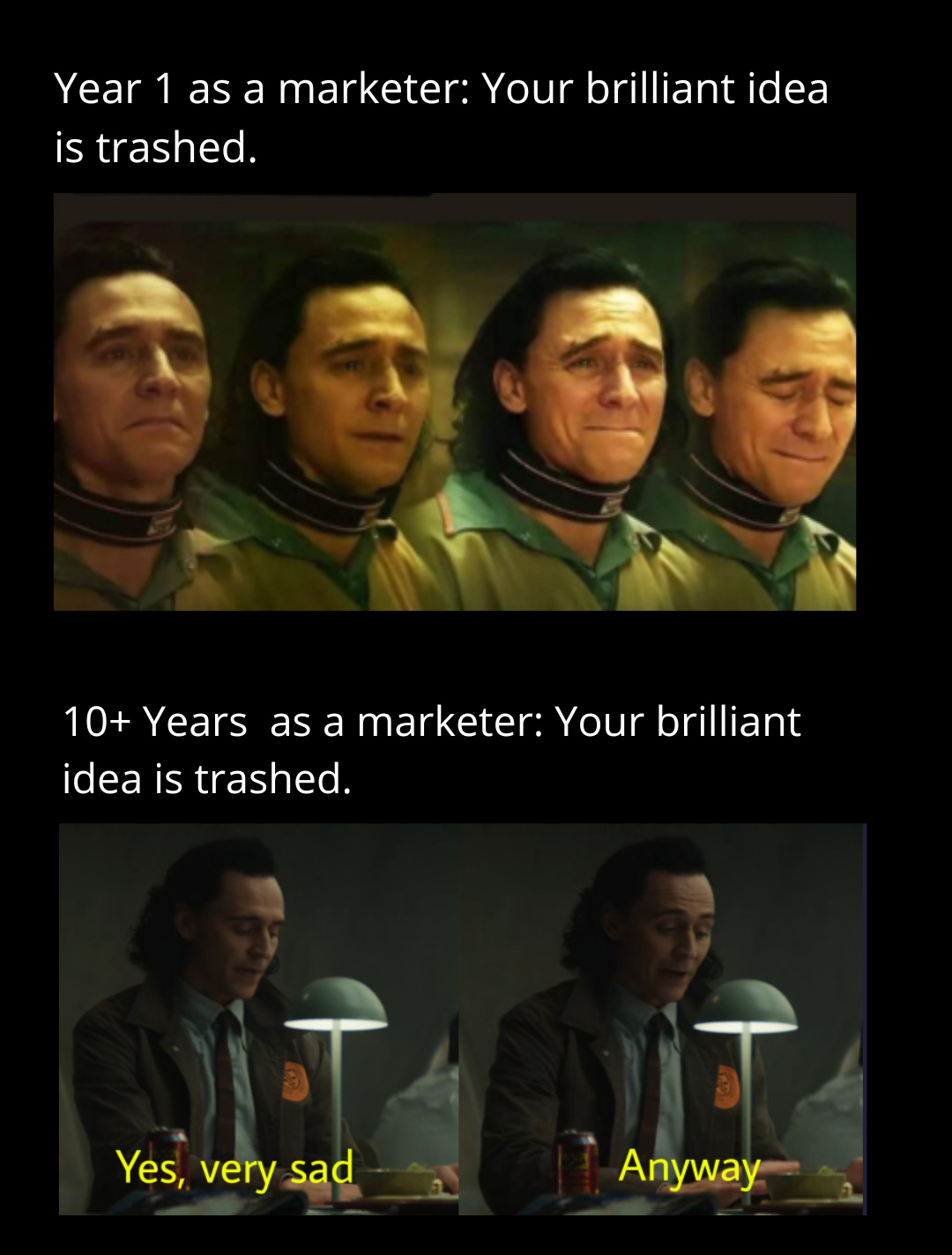Marketing Dojo #39: Blessing or A Curse?🤔 Navigating the Deepfakes.
How deepfakes enable 24/7 livestreaming, Paramount is giving Mean Girl vibes, nano-influencers are in demand and lots more.
Hello, fellow marketers,
Your inbox is a busy place, so thank you for opening the Marketing Dojo.
Before we dive into our usual goodies, I've got a tale that gripped me.
Let's talk about Katalin Karikó and Drew Weissman. The duo won the Nobel Prize in Medicine for their monumental work on mRNA vaccines - the magic behind the Covid jabs that saved millions.
But here's the backstory that stirred up anger & admiration in me.
Karikó faced significant challenges, including a lack of funding and diminished support from her institution. In fact, she was demoted at the University of Pennsylvania in 1995. Nevertheless, she persisted, later collaborating with Weissman to navigate these scientific challenges.
Her story is a reminder of the potential that can be sidelined when systems lean heavily towards traditionally 'fundable' research over innovative approaches.
Hat's off to scientists like Karikó, who persevere despite seemingly insurmountable challenges. I have found a new hero. 🌟
Give the article a read and share.
In this edition, we cover:
🎭 The rising tide of deepfakes
🚀 Mr Beast's ever-climbing trajectory
🔄 Paramount's "Uno reverse" on TikTok
💃 Nano-Influencers are Keeping Up With The Kardashians
...and so much more to pique your marketing curiosity!
The Rise of Deepfakes: Scams, 24/7 Livestreams, and the New Face of E-commerce
Fake social media, fake out-of-home (FOOH) and now fake ads & 24/7 live streamers: Deepfakes are in the news cycle every week.
Deepfakes are digitally manipulated videos or images where someone's face or voice is seamlessly replaced with another's.
Mr Beast is not giving away the iPhone 15 (Yet)
Last week, Mr Beast called out fake TikTok ads featuring an unsettlingly accurate deepfake rendition of himself. Although there were hitches, such as lip-syncing issues, the video looked frighteningly real.
The future of Livestreaming is fake.
On the other end of the spectrum, livestreamers in China found an innovative and arguably more benign utilization of deepfakes.
China's bustling e-commerce platforms like Taobao have begun adopting AI-generated livestream hosts. The deepfakes of popular livestreamers enable the media to run livestreaming 24/7 at a fraction of the cost.
Companies like Xiaoice (a Microsoft spin-off) offer customized AI streamers for as little as $1,100.
There are several implications for us marketers, some that I could think of:
Trust Erosion: The increasing prevalence of deceptive deepfakes significantly threatens consumer trust. As real and synthetic content becomes more complicated to distinguish, marketers will face heightened challenges in fostering trust and prompting action from their audience.
Cost vs. Quality Trade-off: Deepfakes offer scalability at reduced prices, but the potential dip in authenticity and quality is undeniable. The tightrope walk is going to take a lot of work.
Transparency Mandates: Platforms like Douyin are pushing for clear labelling of AI-generated content. Brands can lead from the front by adopting complete transparency in AI usage.
Misinformation & the role of platforms: The Mr Beast episode sheds light on platform responsibility. TikTok's approval of the misleading ads underscores the pressing need for platforms to enhance scrutiny. Until robust safeguards are in place, the spectre of misinformation looms large. Media will need to be vigilant on ad quality or risk failing on brand safety measures that most brands expect from a platform.
Beyond the Beast Mode.
Jimmy Donaldson, also known as "My Beast" has achieved unparalleled success as a YouTuber.
His videos garnered over 2 billion monthly views last month on his main English YouTube channel alone. It's worth noting that this figure doesn't include the views on other language channels like Spanish, Hindi, and Russian.
Jimmy Donaldson's journey, from his initial steps in 2012 to the colossal reach of Mr Beast today, is an inspiring testament to the power of dedication, adaptability, and a deep connection with one's audience.
Meme-Time: What Doesn’t Kill You, Makes You…..
Not Keeping Up? Why Nano-influencers have better ROI than the Kardashians.
For $1.69 Million, you can have Kim Kardashian craft an Instagram post for your brand. Despite her impressive following of 334 Million, making her the platform's most-followed celebrity, the Instagram algorithm ensures that only a fraction (15-20 million) see your post. Furthermore, a mere 1% might engage with it.
Conversely, nano-influencers present an enticing alternative with their tight-knit following ranging from 1,000 to 10,000. Not only do they come at a fraction of the cost, but their engagement rate is typically higher, averaging around 12%. Collaborating with them guarantees more targeted exposure, authentic interactions, and genuine endorsements.
Recent insights from Adweek's article highlight the shift towards nano-influencers:
39% of brands lean towards nano-influencers for marketing ventures.
Only 19% still choose macro-influencers with followers between 100,000 to 1 million.
A scanty 12% give priority to partnering with celebrity bloggers.
Given these numbers and the evolving landscape of influencer marketing, it raises the question: where do you see the future of brand endorsements heading? What role do mega-influencers play in brand-building?
Paramount makes a Mean Girl Move.
If you've spent time on TikTok, you have likely come across short clips of TV series or movies.
Cutting a movie into parts and uploading them is a trend on TikTok. This "clip culture" led to GenZ discovering old classics like Legally Blonde and Confessions of a Shopaholic. But it also creates piracy concerns for movie houses.
But as the saying goes, "If you can't beat them, join them." And that's precisely what Paramount Pictures did.
To celebrate "Mean Girls Day" on October 3rd, Paramount ingeniously sliced their cult classic "Mean Girls" into 23 segments and uploaded them officially on TikTok for a day.
The move wasn't just trendy; it was strategic.
Official Content: Paramount ensured top-quality clips, maintaining content control.
Audience Engagement: Being official snippets of a beloved movie meant users would interact heavily, pushing these clips to a wider audience.
Adapting to Change: Rather than resist the TikTok trend, Paramount embraced it, resonating with a younger audience and making a mark on their preferred platform.
In the digital realm, adaptability is vital. Paramount's TikTok strategy is a testament to how perceived threats can become golden opportunities when approached creatively.
Short Stuff:
Netflix takes a leaf out of Disney’s playbook and plunges into merchandising to boost fan engagement (Say hello to the character-based revenue model).
Meta’s AI sandbox is now open to all advertisers - the first three tools focus on image expansion, text generation & background creators (Enterprise AI-use cases are here).
Price increases, the value of remaining the default browser and some more. A few details of Google’s largest anti-trust battle are emerging. (News trickles in from a closed-door trial).
That's it for this week's Marketing Dojo. If you found value or enjoyed the content, a quick like would mean the world. Every like helps this newsletter reach more curious minds like yours.
Thank you for your time and attention. See you in your inbox next week.
Ciao,
Garima
P.S. I spent quality time with my mom watching Netflix’s "Live Till 100." A must-watch to inspire our parents about health and well-being. Highly recommended!








